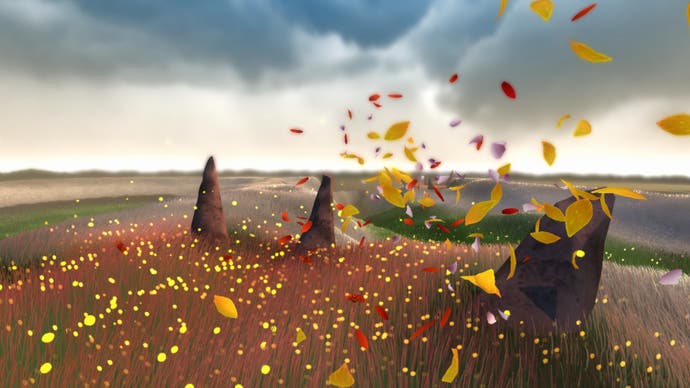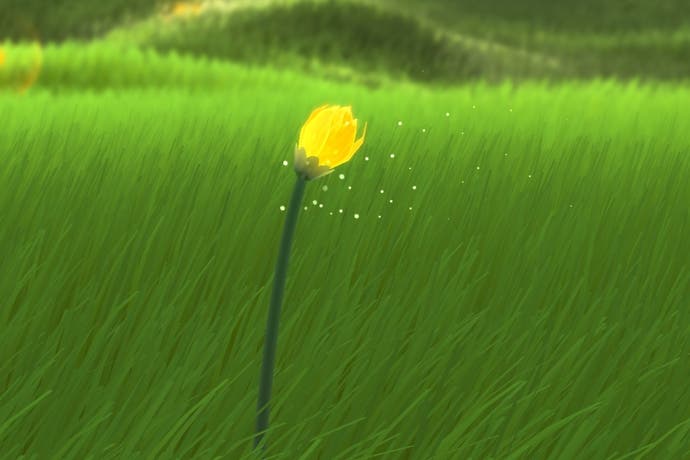What to make of flOw and Flower on PS4?
Once more with feeling.
When thatgamecompany sets out to make a game, one of its main goals is to make us feel something unusual. From flOw to Flower to its BAFTA-winning Journey, the studio founded by Jenova Chen and Kellee Santiago has shown little interest in conveying a specific message or framing interactive metaphors and instead tailors its work to elicit a range of responses. For me, it's a goal it achieves time and again.
With the developer's 2007 debut flOw and 2009's Flower now nestled amongst the big-budget blockbusters and PS Plus offerings of the PlayStation 4 online store, it's been a pleasure to return to both titles and revel in game design that transcends the console generation barrier. flOw and Flower may be several years old, but both are worthwhile additions to the PS4 library, and while neither goes out of its way to exploit the unique features of the DualShock 4, there's some subtle use of the controller's speaker and rumble features, while the mandatory Sixaxis control scheme quickly feels natural rather than forced or gimmicky.
The good news for existing fans is that both flOw and Flower are Cross-Buy enabled, which means if you've bought either the PS3 or Vita-specific versions then you can download the PS4 iterations for free and, as should be expected, both titles run at 1080p and 60fps. The unique visuals of both games disguise their age, but it's especially glorious to see Flower's expansive, dreamlike vistas rendered in full next-gen-o-vision. (As a side note to Trophy hunters, each version also comes with its own set of shiny virtual trinkets, which means there's double or even triple the number to collect depending on how many versions you have access to.)

For all of the discussion of the abstract and emotional experiences offered by both flOw and Flower, though, they contain a number of traditional game design elements. This is most obvious in flOw, where you begin as little more than a mouth with a tail, and then set about gobbling down single-cell organisms in order to grow, progressing through the depths at your own pace and ultimately unlocking additional organisms to experiment with. Different food types affect your tiny avatar in different ways and so a fundamental part of the experience is getting to grips with and then fuelling the evolution process.
As the organism evolves, so too does the focus of your journey. Soon, you shift from self-preservation to actively hunting other, more dangerous entities, and it's with a curious mix of pride, admiration and growing discomfort that I've watched my tiny underdogs grow into something that is at once marvellous and unexpectedly vicious - the hunted becoming the hunter.
Chen's original concept for flOw was part of his Master's thesis on the exploration of dynamic difficulty adjustment, and while it does adapt to your skills it's not interested in Game Over screens or fail states. Instead, this is an examination of how we interact with games, and so it feels like no coincidence that flOw is one of those rare releases where the PlayStation Trophy criteria encourages you to explore different ways of playing, rewarding pacifists and perfectionists as well as players who seek to master the unusual control scheme.

Certainly, flOw has the markings of a traditional game with progression, special abilities and goals, but there's also an ethereal quality to the ways you explore its mechanics, choosing how much you engage and how quickly to progress. It's part puzzle, part virtual fish tank, and despite its minimalist aesthetic it's surprisingly deep; it also serves as a fine introduction to thatgamecompany's portfolio.
Flower is the more abstract experience, but it's also more accomplished, delivering a deeper and more satisfying experience and invoking quiet introspection. You control the breeze, which is an interesting enough start, and you begin each of the five levels by shepherding a single petal across varied landscapes. Gliding past flowers causes them to bloom and release another petal to swell your effervescent following, rewarded with an additional splash of colour.
Flower has an overarching narrative, but really its story is one of your own making as you find personal meaning in the juxtaposition of lush meadows, darkened farmsteads and metal-choked cityscapes. Like Journey, I find playing Flower is by turns joyous - its warm palette can be a soothing balm that lifts my spirits on a cold and grey winter's day - and melancholic. The first level in particular makes me feel warm, happy, quiet and wistful, as lush colours surge across the screen and life returns to the washed-out landscape.

It's easy to wax lyrical about the personal impact of Flower's imagery, the simple beauty of its musical score or the fascination of manipulating the PS4 controller in an unusual and yet inexplicably natural way. Here too, though, there are more universally recognisable game elements in the form of hidden collectibles and an increasing difficulty level.
Flower is also more rigidly structured than flOw and features barriers to progress that require you to solve basic visual puzzles or swell your collection of petals to open the way to the next area. While its five levels are short, they offer a varied mix of visual and aural experiences with hidden secrets and unexpected Trophies that reward playful exploration and unusual interactions. They also give you the feeling, unusual for video games, that you're not just collecting stuff but also enhancing the environment rather than diminishing it.
flOw and Flower are both expressive, interesting creations, then, but both are also interesting and entertaining games in their own right. It's fascinating to play them again - or anew - and consider how Journey was born from these beginnings, drawing on the game elements of flOw and the evocative qualities of Flower. Hopefully one day Journey itself will make its way to PS4, but in the meantime thatgamecompany can be proud that its early games haven't been overshadowed by its subsequent masterpiece. They're still enjoyable, and how they make you feel still very much depends on who you are.

